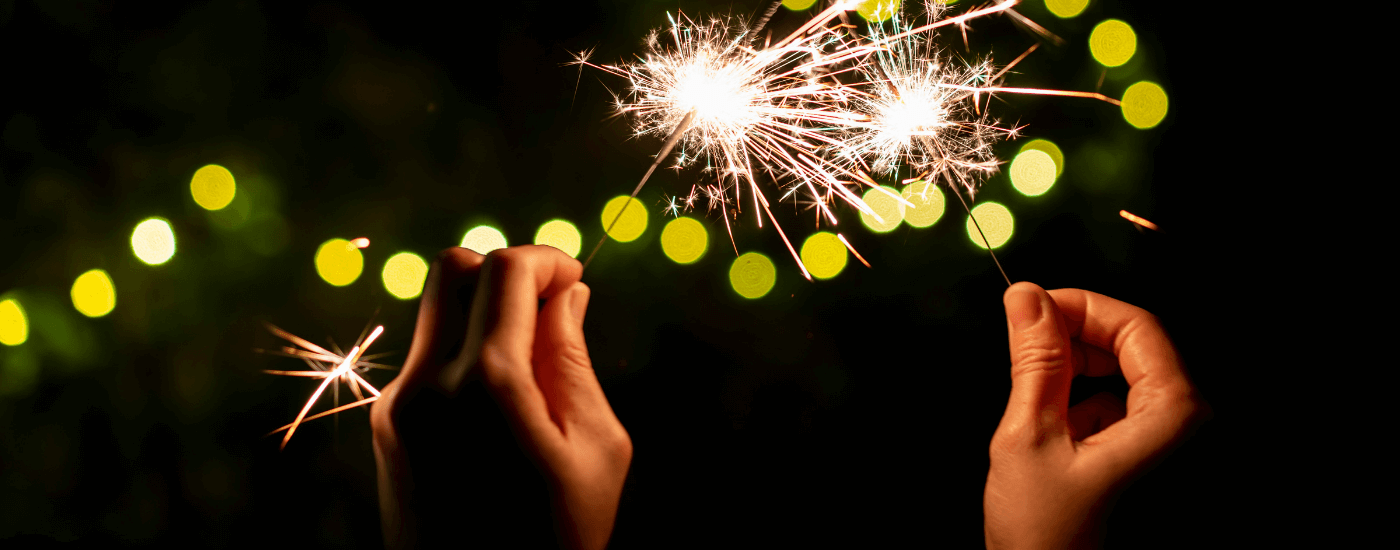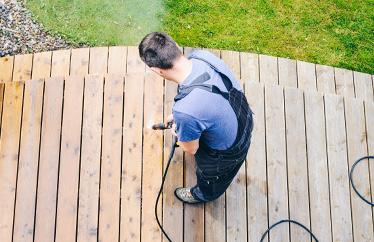The Fourth of July is one of the most exciting holidays of the year — and also one of the most dangerous. It’s fun to gather with friends and family, grill delicious food, and watch firework displays to celebrate the country’s independence, but the day’s festivities also come with a lot of potential hazards to you and your home.
Common Fourth of July hazards
The biggest hazard on the Fourth of July isn’t a barbecue burn — it’s a firework-related accident, fire, or injury. Lighting fireworks and sparklers at home without proper training and supervision is extremely dangerous.
According to the Consumer Product Safety Commission’s 2020 Fireworks Annual Report, fireworks played a part in an estimated 15,600 injuries treated in US hospital emergency rooms throughout 2020, with 66% of those injuries occurring in the weeks leading up to and after July 4, 2020. Common injuries from fireworks include burns to the hands, fingers, arms, and legs; head, face, and ear trauma; and contusions, lacerations, fractures, and sprains.
Firework safety tips for the Fourth of July
Here are some critical firework safety tips to keep in mind this Fourth of July (and all year long):
1. Purchase legal fireworks
If you decide to dabble in firework usage, make sure you’re only purchasing legal fireworks. These have a label with the manufacturer’s name and instructions for use.
Illegal fireworks aren’t designed for consumer use because they’re dangerous to handle. Plus, depending on the state you live in, purchasing or selling prohibited fireworks is a crime. Check out your state’s firework laws to see what your options are.
2. Never let children handle fireworks
Keep fireworks — whether lit or unlit — away from children and adolescents. Even seemingly safe options like sparklers still burn at 2,000 degrees, and can cause unnecessary accidents and burns in the hands of minors. If teenagers or young adults want to use sparklers or help light other legal fireworks, make sure you educate them beforehand on firework safety and monitor them closely during the activity.
3. Practice smart firework safety
There are a number of steps you should take before, during, and after using fireworks to ensure everyone’s safety. It’s also crucial to educate everyone who wants to participate in the firework display about proper firework safety rules.
Before using fireworks
- Store fireworks in a non-flammable container (like a plastic storage box) in a cool, dry place (like a basement).
- Don’t store fireworks near a heat source; things like water tanks can put off a lot of heat and accidentally ignite a firework.
- Check to make sure your fireworks haven’t been dampened in storage. Moisture can break down fireworks and make them unsafe for use.
- Store fireworks somewhere children, adolescents, and pets can’t access them.
When using fireworks
- Never light fireworks indoors.
- Never ignite a firework in a container.
- Never hold a lit firework.
- Never use fireworks when under the influence of drugs or alcohol.
- Bring pets indoors and contain them in a safe area, like a crate or closed bedroom, so they’re not scared by the fireworks.
- Read the manufacturer’s instructions for each firework before lighting it, and follow instructions when igniting.
- Only use fireworks outside, at least 15 feet away from people, houses, and any flammable items.
- Wear protective eyewear when lighting fireworks.
- Keep a bucket of water nearby to extinguish fireworks or put out any fires.
- Only light one firework at a time, then stand at least 15 feet away from the firework while it lights up.
- Only approach a lit firework once it has died out (wait at least one minute each time to be safe).
- Never re-light fireworks or try to handle malfunctioning fireworks.
After using fireworks
- Soak any spent and unused fireworks in a bucket of water for three hours before discarding them in the trash.
- Check the area for any sparks or remnants of fire that need putting out.
- Pick up any firework trash and debris to prevent kids or animals from consuming it.
Remember, though: the best way to prevent firework-related injuries and accidents is to steer clear of home firework displays. Without the right knowledge or training on how to safely use fireworks, you’re putting yourself — and the people around you — at considerable risk. Unless you’re experienced with firework usage, skip the home fireworks shows and check out a professional display instead.
5 other important safety tips for the Fourth of July
Fireworks are the most hazardous activity on July 4, but they’re not the only risk. Follow these five safety tips to ensure you, your loved ones, and your home stay protected throughout the festivities.
1. Protect your home and property from wildfires
Even if you’re not using fireworks at home, it’s still a good idea to invest in fireproofing measures for your property. Not only does summer bring hot, dry wildfire weather to many areas, but your neighbors might be using fireworks — and putting your property at greater risk of fire.
Here are some ways to protect your home against wildfires:
- Replace your roof: Your roof is the most at-risk in a wildfire because of its size and orientation, according to FEMA. If possible, consider replacing your roof with a Class A-rated roof with noncombustible coverings.
- Replace roof eaves: Use short overhangs and flat ledges instead to prevent embers from catching and spreading a fire.
- Prevent wind-blown embers: Cover exterior attic vents and under-eave vents with metal wire mesh (no larger than 1/8 inch) to keep embers out. Install metal flashing where wood decking meets siding (if your siding is combustible).
- Create a 30-foot defensible zone around your house: Move firewood away from your house, clear dead or flammable vegetation, and remove flammable or combustible materials.
- Fortify your windows: Replace any single-pane windows with multi-pane, tempered glass windows with screens to protect them from radiant heat. Fireproof shutters are also helpful.
- Regularly clear out debris: Set aside time once a week to remove debris (like leaves, twigs, and trash) from your gutters, roof, and outdoor space. Wind-blown embers can light debris and spread fire. It’s also a good idea to clean your window screens and attic vents of debris.
- Increase water access: If you don’t already have one, consider installing an external sprinkler system in your yard. It’s also smart to replace your garden hose with a longer tube, so you can easily fill up large tubs or buckets of water in case of fire.
- Seal gaps: Use fire-resistant caulk, mortar, or fire-protective expanding foam to seal gaps in exterior walls and roofs.
2. Create an emergency response plan
Having an emergency response plan in place during the Fourth of July can help prevent accidents from escalating. A couple of weeks ahead of the holiday, sit down with your family or housemates to discuss potential emergency scenarios and action plans. You may want to:
- Check to see if your first aid and disaster preparedness kits have everything you need.
- Build an emergency grab-bag in case you need to leave your property quickly.
- Designate one person to be the sober driver in case anyone needs to go to the hospital.
- Pick a meeting place in case you get separated from your loved ones.
- Post the address to the nearest hospital and any emergency numbers in an easily accessible place, like the fridge. Load everyone’s phone with the nearest hospital address and phone number as well.
- Make a communication plan with your loved ones.
3. Hire a lifeguard to watch kids in bodies of water
If you’ll be hanging out with kids near a pool, lake, or ocean on July 4, make sure there’s a lifeguard around to offer extra supervision. If you’re at someone’s home, you may need to hire a lifeguard for the day. Even if there are plenty of other adults present, it’s smart to take extra caution.
A certified lifeguard can watch kids, remind everyone of safe swimming practices, and intervene in the event of a scare or emergency. As an added precaution, make sure everyone nearby knows the signs of drowning, and that at least a few people present know how to do CPR.
Other water safety practices include:
- Put lifejackets on children on boats.
- Don’t drive boats or do water activities (like wakeboarding or tubing) under the influence of alcohol or drugs.
- Don’t go swimming under the influence of alcohol or drugs.
- Heed caution when swimming in natural waters; pay attention to signs that warn of rip tides, waves, and currents.
- Always swim with another person.
4. Practice safe grilling
Grilling accidents and negligence can cause fires, property damage, and injuries. If you’re planning to barbecue this Fourth of July, make sure you follow the NFPA’s basic grilling safety tips. Those include:
- Never use propane and charcoal BBQ grills inside.
- Position the grill away from the home, deck railings, eaves, and hanging branches.
- Keep kids and pets away from the grill.
- Never leave the grill unattended.
- Regularly clean your grill to remove grease and fat buildup.
- Make sure your gas grill lid is open before you light it.
- For propane grills, check the gas tank hose for leaks before using it.
- For charcoal grills, only use charcoal starter fluid as a starter fluid; don’t add charcoal fluid or other flammable liquids to the fire.
5. Check your home insurance
Updating your home insurance plan can help you stay protected this Fourth of July. Start by reaching out to your insurance agent. They can review your policy in detail, answer your questions, and help you beef up your coverage if needed.
Use Hippo for Fourth of July prep and peace of mind
Fourth of July accidents happen; when they do, it’s helpful to have Hippo home insurance. With Hippo, you get access to Hippo Home Care, so you can chat with home experts and get personalized guidance on how to safeguard your home for the Fourth of July. We pair modern insurance with smart home technology, so you can protect your home this summer — and all year long.
Learn more about Hippo Home Care or get a quote in 60 seconds.




